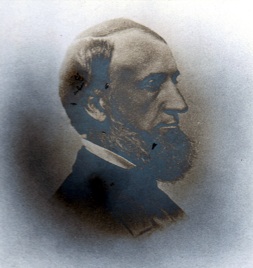Joseph Skinner
Joseph Oberlin Skinner (1816-1892) - Nineteenth Master of Corinthian Lodge[edit]
Overview[edit]
Brother Rev. Joseph Oberlin Skinner, born February 18, 1816, in Piermont, New Hampshire, was an influential Mason and Universalist minister. Serving as the eighteenth Master of Corinthian Lodge from 1845 to 1849, Skinner was also Grand Chaplain for the Grand Lodge of Massachusetts from 1844 to 1848. His Masonic and ministerial careers spanned numerous congregations and Masonic roles across New England, leaving a legacy of dedicated service.
Masonic Involvement[edit]
Skinner was initiated in Middlesex Lodge, Framingham, in 1840, and served as both Junior and Senior Warden before becoming Master for two years. Recognized for his dedication, he was appointed Grand Chaplain of the Grand Lodge of Massachusetts and served from 1844 through 1848. He officiated as Chaplain during a major Masonic celebration at Bunker Hill Monument in 1845, where a replica monument was ceremonially placed inside. Skinner’s commitment to Masonry was not confined to his duties in the Grand Lodge; he later joined Corinthian Lodge in 1846, where he served as Master in 1847 and 1848, focusing on reinvigorating and exemplifying Masonic practices.
Personal Reflections on Freemasonry[edit]
In 1873, Skinner expressed his enduring regard for his early Masonic experiences, recalling the camaraderie of notable Masons such as Revs. Asa Eaton and George M. Randall, and laymen like Charles W. Moore and Winslow Lewis. Skinner viewed the Institution as a powerful moral and social influence, describing Freemasonry as “a serene retreat” amid “the noise of party conflict,” embodying ancient values and fostering unity among its members. He frequently spoke on the essence of Masonic brotherhood, seeing in it an "open secret" of mutual confidence and reciprocal support that transcended time and societal divisions.
Ministerial and Public Service[edit]
Skinner’s career as a Universalist minister took him across New England. After initial pastoral work in Holliston, he served congregations in Framingham, Dudley, Concord, Massachusetts, and later in Ludlow and Chester, Vermont. By 1853, he was settled as pastor of the First Universalist Church in Rockland, Maine. Beyond the pulpit, Skinner edited publications such as *The Universalist Register and Almanac* (1871-1874), wrote for the *Universalist Quarterly Review* (1854-1870), and contributed to the *Christian Repository*. He took an active interest in public education and served in various roles in the superintendence of public schools.
Later Masonic and Ministerial Roles[edit]
Skinner continued his Masonic service as Chaplain of Waterville Lodge No. 33 in Waterville, Maine, where he was working on a history of the Lodge as it approached its 50th anniversary. He also held pastorates in Nashua, New Hampshire; St. Albans, Vermont; and Malone, New York, and contributed to Masonic publications, such as Moore’s *Freemason's Monthly* in 1843.
Personal Life[edit]
Skinner married Maria T. Barnard of Hartford, Connecticut, on May 21, 1846. After her passing in 1852, he remarried Candace L. Fullam of Ludlow, Vermont, in 1854. His legacy in both Masonry and ministry remains one of dedication to fraternity, faith, and public service.
